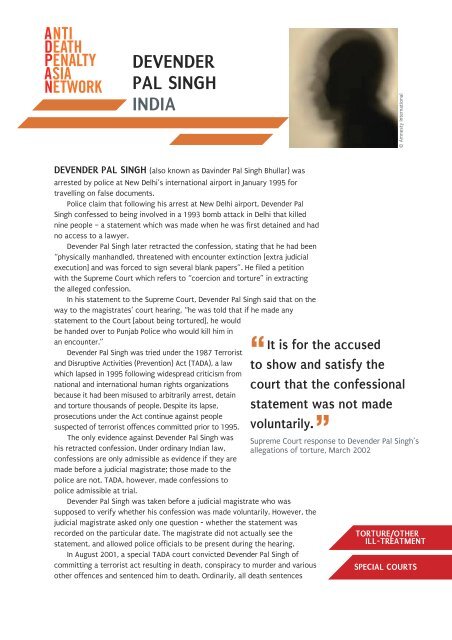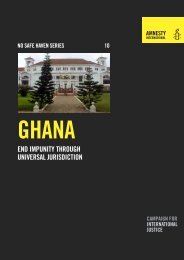Injustice - Amnesty International Schweiz
Injustice - Amnesty International Schweiz
Injustice - Amnesty International Schweiz
You also want an ePaper? Increase the reach of your titles
YUMPU automatically turns print PDFs into web optimized ePapers that Google loves.
DEVENDER<br />
PAL SINGH<br />
INDIA<br />
© <strong>Amnesty</strong> <strong>International</strong><br />
DEVENDER PAL SINGH (also known as Davinder Pal Singh Bhullar) was<br />
arrested by police at New Delhi’s international airport in January 1995 for<br />
travelling on false documents.<br />
Police claim that following his arrest at New Delhi airport, Devender Pal<br />
Singh confessed to being involved in a 1993 bomb attack in Delhi that killed<br />
nine people – a statement which was made when he was first detained and had<br />
no access to a lawyer.<br />
Devender Pal Singh later retracted the confession, stating that he had been<br />
“physically manhandled, threatened with encounter extinction [extra judicial<br />
execution] and was forced to sign several blank papers”. He filed a petition<br />
with the Supreme Court which refers to “coercion and torture” in extracting<br />
the alleged confession.<br />
In his statement to the Supreme Court, Devender Pal Singh said that on the<br />
way to the magistrates’ court hearing, “he was told that if he made any<br />
statement to the Court [about being tortured], he would<br />
be handed over to Punjab Police who would kill him in<br />
“<br />
It is for the accused<br />
to show and satisfy the<br />
an encounter.”<br />
Devender Pal Singh was tried under the 1987 Terrorist<br />
and Disruptive Activities (Prevention) Act (TADA), a law<br />
which lapsed in 1995 following widespread criticism from<br />
national and international human rights organizations<br />
because it had been misused to arbitrarily arrest, detain<br />
and torture thousands of people. Despite its lapse,<br />
prosecutions under the Act continue against people<br />
suspected of terrorist offences committed prior to 1995.<br />
The only evidence against Devender Pal Singh was<br />
his retracted confession. Under ordinary Indian law,<br />
confessions are only admissible as evidence if they are<br />
made before a judicial magistrate; those made to the<br />
police are not. TADA, however, made confessions to<br />
police admissible at trial.<br />
Devender Pal Singh was taken before a judicial magistrate who was<br />
supposed to verify whether his confession was made voluntarily. However, the<br />
judicial magistrate asked only one question ‐ whether the statement was<br />
recorded on the particular date. The magistrate did not actually see the<br />
statement, and allowed police officials to be present during the hearing.<br />
In August 2001, a special TADA court convicted Devender Pal Singh of<br />
committing a terrorist act resulting in death, conspiracy to murder and various<br />
other offences and sentenced him to death. Ordinarily, all death sentences<br />
court that the confessional<br />
statement was not made<br />
voluntarily. ”<br />
Supreme Court response to Devender Pal Singh’s<br />
allegations of torture, March 2002<br />
TORTURE/OTHER<br />
ILL‐TREATMENT<br />
SPECIAL COURTS
















